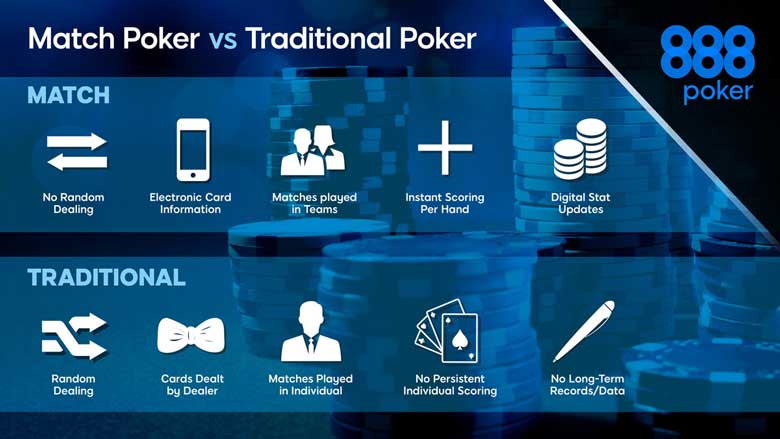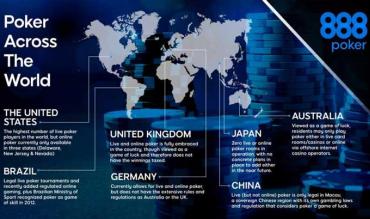The debate over whether poker is a sport is more than a matter of semantics. In many countries, its classification has serious legal and tax implications. So, who is right?
In 2015, Erik Seidel, a professional poker player who was inducted into the Poker Hall of Fame in 2010 and has won eight world series to date, made $5 million from playing in poker tournaments around the world. To put that total into perspective, Harry Kane, an England striker and forward for Premier League side Tottenham Hotspur, earns in the region of £2 million a year.
Despite the financially comparable benefits of poker versus playing sports professionally, still the debate rages on as to whether the former could truly ever be classified as a ‘sport.’ It’s certainly an argument with an elusive answer, and many differ in their opinions on the matter.
So, where do we begin?
Table of Contents
Sport's Emphasis on Physical Activity
“You’ve got to be kidding me,” retorted poker pro, Dennis Phillips, when asked by Gary Wise of ESPN if poker had a rightful place in the Olympics. “Any game where Phil Hellmuth could be an Olympian shouldn’t be an Olympic sport.” While his reply was light-hearted enough, it went a long way towards reflecting the feelings of many people, both within and outside of the poker profession.
“It’s not a sport; sport involves athleticism,” answered Barry Greenstein. Greg Raymer, the winner of the 2004 Poker World Series Main Event, gave his reply: “No-one should be winning medals based on one tournament, because the results of one tournament have no bearing on who the best player is. Poker’s a game of long-term skill – we’d have to play for months.”
Out of the six professionals that Gary Wise interviewed, all of them were in agreement that poker isn’t, or shouldn’t be, considered a sport. Poker has its own place, it would seem, and that place isn’t among the ranks of football, basketball, or baseball, however similarly their financial potentials weigh up.
We would, perhaps, do well to define the term ‘sport’ at this point. The Merriam-Webster dictionary offers this:
Sport is, “An athletic activity requiring skill or physical prowess and often of a competitive nature, as racing, baseball, tennis, golf, bowling, wrestling, boxing, hunting, fishing, etc.”
So sport, by definition, is a pastime, diversion, or recreational activity with a standard set of rules, a particular level of skill, and, certainly, the inclusion of physical activity. Therefore, if the poker professionals themselves are in agreement that poker isn’t a sport and it would appear, by literal comparison, that it doesn’t fulfil the definition of a sport, is there any need for an argument regarding poker’s classification at all?
Is It Really that Straight forward?
It would appear that things aren’t quite that straightforward, though. The International Mind Sports Association is dedicated to the argument that mentally challenging activities are just as gruelling as those that are physically challenging, and is determined to one day place its games at the Olympics, alongside physically demanding sports.
Already satisfied that chess, bridge, cribbage, and draughts meet the necessary requirements to be deemed mind sports, the IMS has determined that poker is indeed a sport, and went so far as to classify it as a mind sport in 2010.
In addition, there have been numerous case studies, articles, and books published regarding the ways in which poker players prepare themselves for tournaments. Many of the tips, including getting adequate rest and indulging in light physical exercise beforehand, could be confused as advice for training athletes.
It is argued that players suffering from fatigue or physical exhaustion are at a huge handicap during a long, drawn out poker tournament – just as you’d expect to see in an athlete that hadn’t kept up with their rigorous training regime.
“Physical fitness and well-being have long been shown to drastically aid mental concentration, and it is no coincidence that some of the best tournament players in the world right now are extremely physically fit,” relates one study.
While there are those that would argue that keeping fit has nothing to do with playing poker, few could doubt the mounting evidence that staying fit and active can help the mind during a workout of its own. Do you remember Gary Wise’s questioning of six top poker players? During that interview, Mike Sexton, a member of the Poker Hall of Fame, said this: “Certainly, in terms of the mental side of it, I don’t think any sport ranks higher.”
But, hang on – the debate is about to get interesting with the assertion that poker cannot possibly be a sport, since players very rarely end up in dirty, sweat-stained clothing by the end of a tournament. So, is it a game?
The Oxford Dictionaries define a game to be: “A form of competitive activity or sport played according to rules… an activity that one engages for amusement”.
That certainly sounds like poker, and many countries (that we will look at later) are happy to define poker as a game based upon its dependence on a degree of chance, rather than players’ skill. However, while it’s certainly true that poker is by no means a physical activity – unless you count the throwing of chairs following a bad hand, or a jump of exuberance to celebrate a win – is that enough to dismiss the notion of poker as a sport altogether?
After all, there’s still as much drama around the table as there is on any pitch, as well the thrill of the competition and the impressive mental stamina on show.

Poker Challenges Players' Skills, but What about Luck?
If sport, or mind sports, is defined as an activity that presents its players with a set or rules, mental or physical challenges, and recreational play, then surely poker fulfils more than one of these determinations.
Similarly, if games are classified as being pastimes that are there for our amusement, then poker falls into this category, as well. However, one of the complicating factors in the “games-or-sport” debate is the role that luck plays in poker.
Indeed, many governing bodies are reluctant to classify poker as anything other than a game, owing to the dominance of chance over skill, a factor that would seemingly rule poker out of being a sport.
So, yes, poker presents a challenge to those who participate – but it can also be dominated by the luck of the draw.
Now things get really interesting: introducing Match Poker, a team poker game that promotes skill over chance, and has introduced the use of mobile technology as a means to eliminate luck and, instead, create winners based on their ability to manage a common deal.
So, how does it work? Teams playing Match Poker are split onto different tables, with one player from each side taking a corresponding seating position. Using electronic devices, the cards are then dealt, and the same cards are given to all four tables. The element of chance is suddenly removed, as every player in that corresponding seat on each table is dealt the same cards.
Match Poker is about identifying the best players and the best teams, based upon how they interact with the hands that are dealt to them. With the luck element removed, does Poker stand any more of a chance of being classified as a sport?
SportAccord, the umbrella organisation in charge of all Olympic and non-Olympic sports certainly thinks so, and, at the end of March 2016, stood on the cusp of awarding poker a full membership.
International Federation of Poker president, Patrick Nally, said of the ruling: “We’re finding more governments are trying to understand us, understanding match poker, beginning to understand that poker as a mind sport has a role to play, and is now beginning to be more and more accepted at a national level. In the future, I think we will see more and more competitions, more and more ranking as it relates to skill and poker will find its place as a very major mind sport within that mind sport community.”
With over 50 participating countries, the IFP is rightfully proud of this certification. Could poker be on the cusp of being recognised as a sport after all?

The Major Poker-Playing Countries Weigh In
While poker is poker, no matter where you are, the country in which you happen to be standing will determine whether you’re playing a sport or a game, and whether you’re gambling illegally. Indeed, poker’s very classification introduces a wealth of legal and tax implications. It seems that attempting to catalogue it as one thing or another is wholly more complicated than anybody could have imagined.
In most countries, including members of Europe, poker is generally regulated as a game – and more specifically, a game of chance, rather than skill. For this reason, poker is consigned to casinos and similar venues, including card rooms, and subject to gambling laws established by the EU or a similar governing body. There are, however, at least nascent signs that all of this could be changing in some countries. Could poker be on the up, after all?
Let’s have a look at some of poker’s major players and the classifications they use:
Brazil
The Brazilian Ministry of Sport recognized poker as a “mind sport” in 2012, and appointed a governing body, the Brazilian Confederation of Texas Hold'em (CBTH), in order to regulate the pastime. The Ministry stated that, “Poker is a competitive practice in which the participant requires intelligence, ability and intellectual and behavioural skills to succeed.”
This sides with the idea that poker is so much more than a game of chance, and the classification seems to have some symbolic significance for poker’s Olympic future as a sport. Brazil is hosting the 2016 Summer Olympics in Rio de Janeiro, although poker will not be an Olympic sport in 2016.
While its recognition as a mind sport is great news for poker, its legal status in Brazil is becoming more complicated; the Brazilian Congress is considering a bill to legalize gambling at a limited number of approved casinos. As poker is currently only legal during live tournaments, the effect that such legislation would have on poker is unclear.
Whatever happens, poker continues to flourish in Brazil, with tournaments proving highly popular. The 2014 BSOP Millions, considered the Main Event of the Brazilian Series of Poker, drew more than 2,700 entrants, making it the second-largest poker tournament in the world and the biggest outside of Las Vegas. The event awarded the equivalent of US$2.7 million, with the winner, Wilson Calixto, taking home US$420,000.
Germany
Poker is regulated as a gambling game in Germany, although at least one court, while stopping short of declaring it a sport, ruled that it’s a game of skill rather than chance. While poker fans in Germany hailed this 2012 ruling as a good sign for those who believe poker is a sport, it unfortunately worked against the poker player at the heart of the issue.
Eddy Scharf, a professional player, had filed a lawsuit seeking to make his poker winnings exempt from taxes, arguing that – as it’s a game of chance – any monies won should not be taxed under German law. The court disagreed, and ruled that players who regularly win money at poker do so through personal skill and, therefore, must pay income tax on their winnings.
The United States
In the US, where the global gambling epicentre of Las Vegas draws the best players in the world, poker is considered a game by legal standards. An exceedingly long list of court rulings from virtually every state in the country declares poker to be a game of chance. Although, in most states, the determining factor is whether luck or skill is more prevalent.
Until now, most courts have gone with chance. As in Germany, one such contrary case declared poker to be a game of skill for tax purposes. Although, unlike Germany, that particular court’s decision resulted in a lower tax burden for Billy Baxter, the player who brought the lawsuit. The ruling was limited to taxes and has not affected the states’ power to regulate poker as a game of chance under gambling legislation. Overall, there is virtually no traction in US government for the notion of poker as a sport.
China
China has used the term “sport” with regards to poker on a very limited basis. In 2014, the Beijing Millions, a major poker tournament, was sanctioned by the Beijing Municipal Bureau of Sports – a direct correlation between poker and reference to its potential as a sport.
China has allowed various other events called “poker” under the auspices of sports organizations, but these contests were far removed from traditional poker. They introduced elements such as team play, trump suits, those found in games of bridge, and eliminating wagers. Traditional poker is still mostly illegal as a gambling game in China.
Other Countries
Outside of the examples listed above, most countries, including the UK, regulate poker as a gambling game. In the UK, this classification means that winnings aren’t currently taxed by HMRC, unlike the salaries earned by sports players.
In Japan, however, the status of poker is somewhat confusing, as card and table games are banned, yet major poker tournaments do still take place – and legally. The All Poker Championship offers a prize bundle with a value of $20,000 and a seat at the next World Series, yet no cash prize is awarded. Since no monies are being exchanged, this version of poker is completely legal.
Japan also boasts its own non-profit organisation, the Japan Poker Association, which aims to, “widely spread the game of poker into Japanese culture, and to become a route for Japanese players to play in events abroad.” It would appear that Japan is happy to condone poker, yet cannot legalise it.
The status of poker in Australia is similarly complicated, although it is regulated as a gambling game. In 2001, the Australian Commonwealth passed the Interactive Gambling Act, which classified any service “offering real-money online interactive gambling services to Australian players” illegal, and also put a ban on advertising such services.
However, interactive services such as poker, and wagering during the event, are permitted if they are offered by vendors from outside of the country. Similarly, Australian poker sites are allowed to offer real-money games to those living outside of the country. At a time when officials are seeking to ban electronic poker machines, or ‘pokies’, due to their addictive nature, the future for interactive poker, at least, looks uncertain – could this have repercussions for the truest form of poker too?
Regardless of which country you turn to, there appears to be a contradiction as to how poker should be classified; it is, in effect, a game – or sport – in limbo.
At the End of the Day, Poker Is…
An enigma – or at least it becomes one in terms of a definitive classification. It would appear that poker’s status is in the eye of the beholder:
• Whether you feel poker is a game or a sport, or a combination of the two, is generally down to how you feel about sport and physical exertion.
• Whether you’re prepared to accept that a mental challenge is akin to a physical one.
• Whether or not you believe the luck of the draw is really all that important when it comes to naming names.
For legal reasons, the status of poker will continue to be debated around the world, but isn’t it healthy to discuss these things from time to time? Regardless of where you sit in this debate, you must concede that poker is not an exact fit for any definition, sharing elements of sports and gaming, but lacking enough true components to be considered definitively one way or the other.
The few examples of larger countries classifying poker as a sport are intriguing, but these classifications tend to be for limited purposes, such as taxation, and mostly don’t interfere with the regulation of poker as a game.
So, there you have it; this is a debate during which reasonable minds can differ. One thing still begs to be asked, though: how does poker’s classification affect the way you feel about it?
We’d love to hear your thoughts in the comments section below.


